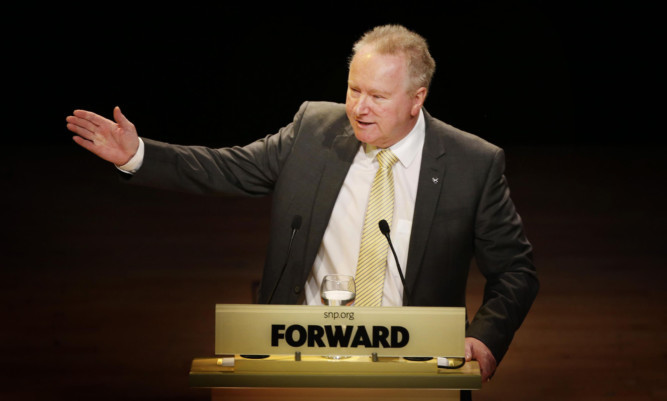
Health Secretary Alex Neil has called for an end to overpriced cancer drugs and pledged the NHS is going to get tough with greedy pharmaceutical firms.
The SNP minister said the body which advises health boards on whether to buy new medicines is going take a harder line in negotiations over their price.
The call was echoed by the former chairman of Scottish Medicines Consortium who accused the big drugs companies of a “your money or your life” approach to introducing new cancer drugs.
The Sunday Post’s “Fighting Chance” campaign is pressing for big improvements to cancer patient care across the country and many of those sufferers are losing out on new drugs which can ease their pain simply because the medicines cost too much.
Mr Neil, addressing a fringe event at the SNP conference in Perth, also called for a pan-European solution to fight back against the high prices charged by drug firms.
He said: “If the pharmaceutical companies keep over-pricing or trying to rig the price I’m not accusing the industry of that but there are some players who give that impression then quite frankly they will not only do damage to the health of the nation but they also do a lot of damage to their own prospects.
“If we had a EU-wide policy in relation to pricing of orphan drugs for example and we spoke with one EU voice and negotiated with drug companies on an EU basis, that would give us the kind of negotiating strength we think is needed to get a fairer deal.
On the SMC’s role in approving new drugs, he added: “Rather than just say no, I would like us to be much more robust in going back to the companies and saying ‘look, if you would reduce the price to more around this figure instead of that figure the chances are we will approve it’.
Our campaign has revealed how cancer patients who have been referred to hospital are facing a postcode lottery over delays to starting treatment, with increasing numbers waiting more than three months.
Some cancers appear to be being given a lower priority than others with health board finances often dictating whether patients will get cancer drugs and live any longer.
Mr Neil’s concern over drug prices was supported by former SMC chairman Professor Ken Paterson.
He said: “This is not a new problem. Ten years ago an expensive medicine cost £5,000 to £10,000, today an expensive medicine is coming in at £50,000 to £100,000 a tenfold increase.
“There’s no competition, it’s a little bit like a highwayman approach, your money or your life. You either pay this or we keep the drug.
“As a health service we need to take a harder line with pharma firms and say we are not prepared to be held to ransom, we are not prepared to pay over the odds for these medicines.
“Make them feel some of the pain that we are feeling as a health service.”
Lesley Stephen, 48, a mother of four from Edinburgh diagnosed with secondary breast cancer in March, told the Breakthrough Breast Cancer event of the personal toll of being denied lifesaving cancer drugs.
She said: “The shock of being told, out of the blue, you have incurable cancer is indescribable.When my consultant told me about [cancer drug] Kadcyla I felt very optimistic, as did he. I thought I would be a good candidate and it could extend my life by number of months if not years and still allow me a quality of life with my children.
“There is not a lot of hope living with metastatic cancer and you are constantly praying that new treatments will come about before it is too late for you personally and Kadcyla gave me that hope.
“When I heard it had been rejected by the SMC, I was very angry I felt a price had been put on my life but that my life was not worth that price.”

Enjoy the convenience of having The Sunday Post delivered as a digital ePaper straight to your smartphone, tablet or computer.
Subscribe for only £5.49 a month and enjoy all the benefits of the printed paper as a digital replica.
Subscribe